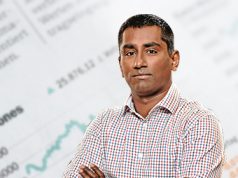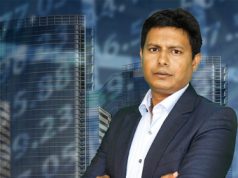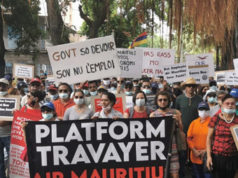As I put pen to paper this morning of the 02nd of May 2020, I looked back and started thinking about how the world is going to change with this Covid-19 crisis. Who would have thought that the whole world would have reached a status of economic sudden-stop? Sometimes, upon waking up in the morning, there’s a feeling that the world has literally stopped, like as if it doesn’t spin or rotate anymore, but yet we all know that mother earth hasn’t stopped rotating at all and it continues to do what it has been doing for more than 4.5 billion of years. Human’s existence is very recent when we compare with mother earth. Let’s not forget that! And when we look at the economy, the latter is even far more recent and yet we think that the economy defines everything in our lives. Let’s pause and think about that for a moment.
Very often and in fact too often, people at large believe the economy is kind of complex or it’s a black box, we keep hearing about the status or the future of the economy on the TV on specialised business channels, or specific section of mainstream newspapers on specific days, that only a few people can understand and explain what’s happening with the economy, that professional economists have the crystal ball (in fact more often they have a mirror to look back rather than a crystal ball to look at the future and yet portray themselves as “economic” fortune tellers), that our political elites are in control of the economy and hence our destiny is (safe?) in their hands.
I have always found it bizarre that the economy which is in fact very simple (if we take time to stop and really reflect about it), unlike finding a vaccine for Covid-19, or unlike sending someone to the Moon, gets so much attention from millions if not billions of people every day and yet the majority seem to be at the receiving end when in fact they are at the core of the economy. Without people the economy is nothing, meaningless and useless, be it poor or rich, black or white, whether you live in the USA or Mauritius. People make/define the economy and yet we have the feeling that the economy makes the people, our lifestyle, what jobs we might have lined up, defines even our political ideologies (capitalism, socialism, communism etc).
I recall when I attended my university days back in the 90s in the UK, my Greek friends always reminded me in my economics classes, that the origin of the word “economy” can be traced back to the Greek word “oikonomia”, which in turn is composed of two words: “oikos”, which is usually translated as “household”; and “nemein”, which is best translated as “management and dispensation.” Thus, the term “oikonomia” referred to “household management”. As simply as that.
Now let’s take this to Mauritius. We all know that Mauritius is a small island (piece of rock) in the middle of the Indian Ocean and far from all the continents. Very much disconnected. We (or rather our grand or great grandparents) all came from somewhere and despite what others (pre, during and post-independence of 1968) felt was a bleak future, Mauritius has turned out to be doing pretty well. We are not Singapore for sure, and probably in my life-time, Singapore will remain a dream for many Mauritians, but let’s at least applaud ourselves that we managed to do quite well. With our sense of “débrouillardise” which sometimes I feel was/is our sense of “batte batter”, we managed to diversify our economic pillars, to create a middle class, provide electricity and water (though latter is still a bit of a problem) to pretty much all corners of Mauritius, have decent internet broad band, and even led to the effect of consumerism and especially to extreme consumerism in the last decade (which I call “l’effet Bagatelle”). At the same time, I have to also highlight that while Mauritius has had 38 years of continuous GDP growth, we still have pockets of poverty in Mauritius and over the last 10 to 15 years, been facing the growing issues of growing youth unemployment, crime, rape, drugs, break down of social fabric (the same social fabric which we used to be so proud of in the past). Mauritius has reached a stage of paradox, while we see BMWs/Mercedes going up and down our roads, we also see (but then pretend we don’t see) increase in poverty. While we see a number of CEOs earning more than Rs2Million per month and yet we see the lowest bottom of employees in the same companies being paid around Rs10K per month, that’s a ratio of 200 to 1! And that ratio has been growing every year exponentially just like an outbreak of Covid-19 before a “containment strategy” is put in place. This paradox, I referred to above, is not sustainable in a small island like Mauritius and we will need to focus our collective efforts to tackle that. There’s a huge task ahead of Mauritius and we need everyone to understand the real “enjeux”. Else we will end up like a number of Caribbean islands or South Africa or Brazil.
Back to the economy of Mauritius. We all know we don’t have resources (as of yet!) like oil, gas, platinum, gold under our soil, unlike a continent like Africa or a country like Qatar. If we were like the Qataris, we could then all or most of us have stayed at home “ad vitam aeternam”, and expect the government to fund our lifestyles. This is not a scenario for us Mauritians. We need to wake up and go to work. We need to make our existing economic pillars stronger, we will need to redefine/rethink a number of our economic pillars, we will need to create new economic pillars and more importantly we will need to manage the Mauritian economy with the utmost discipline. Just like the same way one would manage one’s household. Work, Save, Invest, re-invest and prosper. As opposed to Borrow, Spend, and Splash on useless things leading to an illusion of economic prosperity. For too many years Mauritius has been doing the latter. You remember “La Cigale vs La Fourmi”. Guess who has been like “La Cigale”. Take a look at all the projects that successive governments have invested “tax payers” money (current and future) and that are either white elephants, or that costed far more than was initially budgeted or that produce insignificant and even no returns on investments. And yet government borrowed money on our behalf by the way. We will have to pay for all these and if it’s not now, it will be tomorrow. And the debt of our country which reached 65% of our GDP in 2019 will spiral upwards to what I believe will go well north of 80% post-Covid-19. And we ought to have been less than 60% many years ago and successive Ministers of Finance have failed to do!
So I will end this here for today. Covid-19 could be a blessing a disguise. Yes, I know it has done a lot of economic damage (and we are yet to see the extent of that damage), that we are going to experience the deepest recession over the last 4 decades, that there will be bankruptcies, unemployment will go up next couple of years, and that we might be forced to take a step backwards of almost 4 to 5 years but at the same time we should look at it as an opportunity. This is the time to rebuild a different Mauritius. One that creates economic value for everyone, where the “haves” can look after the “have nots” or at least provide the necessary support to help the “have nots” to stand on their own feet and create economic value. Where we make sure we don’t have a two-tiered society within our small island. And also where we break away from our insularity, where we open our arms to the Mauritian diaspora (yes there are many that are ready to help), where we put the environment at the centre of everything we do (extremely important), where we have the right dosage between two indices or metrics, being GDP growth and Happiness. Let’s take this opportunity to create a new index that others in the world can aspire to. As JFK said in his inaugural speech almost 6 decades ago, “Ask not what your country can do for you, ask what you can do for your country” It’s now or never! We can do it my fellow Mauritians. The future can be bright for every Mauritian.










